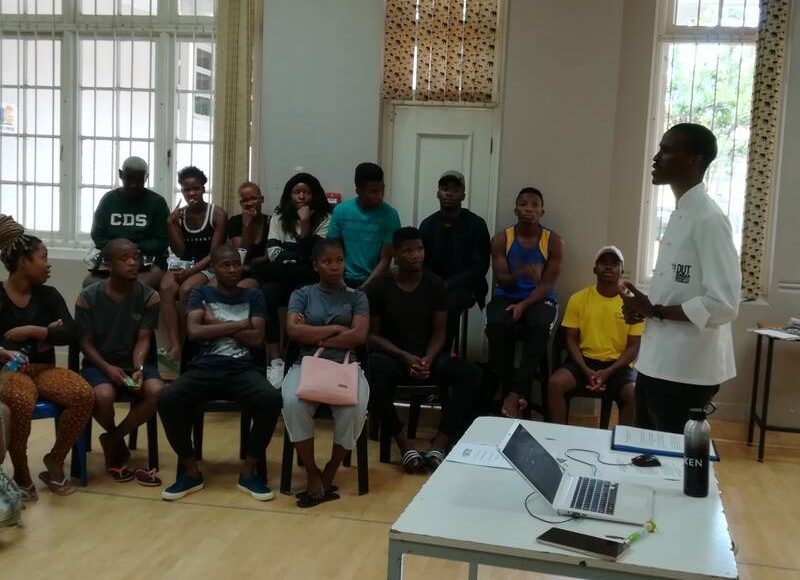It was in 2018, that the Durban University of Technology (DUT) Food Science student, Siboniso Ngcobo while completing his BTech in Consumer Science: Food and Nutrition research study found that tertiary students seldom followed a healthy, nutritious diet once away from home and residing in student accommodation.
Ngcobo identified a food security challenge among university students. It was with these concerns in mind that he established the Vibrant Campuses Nutrition Education Project.
The Vibrant Campuses Nutrition Education Project aims to encourage and instil institutional behavioural attributes that enable staff and students to achieve food security and improved nutrition through enhancing students’ acceptance and consumption of healthy foods, students’ knowledge of nutrition concepts, and their life application. The project also touches on financial literacy, food literacy, and a Cook Safe and Smarter Programme-which is a training programme for vendors.
According to Ngcobo, Vibrant Campuses was a term introduced in the programme called ‘Siyaphumelela–We Succeed’ at DUT to respond to food security challenges currently faced by university students. The initiative addressed food security at tertiary institutions, including attempting to address and or solving nutritional gaps and needs, through improved access to safe and nutritious food.
“Many students at DUT living in self-catering residences, have little meal preparation skills and often don’t know how to shop or budget for the food necessary to prepare a healthy meal. As a result, their nutrition and health are neglected. Therefore, the nutrition education programme is required to end hunger and contribute positively to individuals’ physical and mental capacities, which will, in turn, contribute to poverty elimination. The World Health Organisation (WHO) states clearly that to get to ‘Zero Hunger’ food is not enough, providing food assistance in an emergency can save lives,” explained Ngcobo.
He further clarified that the WHO strongly believes that providing the right nutrition at the right time can assist in changing lives and breaking the cycle of poverty, which is an area of major concern in South Africa and not just in universities.
“While also keeping in mind that the second WHO Sustainable Development Goal (SDG 2) calls on countries to eliminate hunger, attain food security, improved nutrition, and promote sustainable agriculture by 2030,” he said.
Ngcobo said it has been discovered through a survey conducted in Canada, that students with incorrect food choices often performed poorly when compared to students who consumed adequate quality diets.
“Supporting this statement was the findings of a study that focused on the habits of first-year university students, which have indicated that this group, (first-year students) were most likely to gain weight and follow unhealthy lifestyles, which could lead to excessive weight gain, often leading to obesity,” he said.
He explained that the Vibrant Campuses Project is in line with the University’s ENVISION2030 perspective of stewardship, in that it seeks to improve the lives of students, through living DUT’s values and principles within a culture of shared responsibility and accountability and embracing creativity.
“Projects like Vibrant Campuses are crucial to institutions of higher learning to create a shift in the way food aid is perceived and to rather work on introducing a nutrition education programme through which the much needed long-term solutions to help in the fight against hunger, ensure food, and nutrition in security would be realised,” he said.
He indicated that while Vibrant Campuses can ensure that the eradication of hunger and the food nutrition issue is brought to the forefront, the project leader is aware that equipping students with knowledge alone is not a sufficient measure of success.
“The project is more effective when run in conjunction with other similar projects. It is difficult to isolate nutrition and healthy eating education from other components such as feeding programmes. Therefore, this project’s core value is to strengthen alike projects within the DUT for effective and impactful results. An example of this would be for students to receive food as well as nutrition education,” explained Ngcobo.
Vibrant Campuses has numerous external community engagement initiatives, where they train and support domestic production initiatives. One such project is the All Saint Bellair Garden Project, which is a food security project, which aligns with the University’s ENVSION2030 perspective of society, which encourages DUT to enter into mutually beneficial collaborations, making use of the practical application of knowledge.
Ngcobo conveyed that Vibrant Campuses intends to fully ground the use of the evidence-based approach (data/research-based) ideas to show the long-term effects of nutrition education in universities on the eating pattern of students, who are on food plus education, school-based food, and nutrition education programmes which often consist of educational strategies and learning activities, which is supported by a healthy food environment, to help young people and their communities improve their diets and food choices.
“Our collected data will also be used as part of the decision and policy-making process for food insecurity programmes. This will enable us to provide and promote nutrition education across the universities in South Africa and possibly also worldwide, where food insecurity and nutrition insecurity is prevalent,” said Ngcobo.
The Vibrant Campuses Nutrition Education Project was selected as one of the top ten community engagement projects initiated by students during the Community Engagement Pitching and Showcase Awards 2020. The awards are the initiative of the DVC Research, Innovation, and Engagement Office. The project was awarded prize money of R2 500.00.
DUT’s Community Engagement Practitioner, Ms Phumzile Xulu, applauded the work that Vibrant Campuses was doing. She said that it was encouraging to see the youth engaged in solving the problems faced by their communities.
“It is important that the community engagement work that is initiated by students is showcased so to inspire others to look at working with their communities to solve the challenges that they face by using their skills and expertise they learn in universities. Thereby making their learning relevant and applicable to real-life situations,” added Xulu.
Pictured: Siboniso Ngcobo addressing a group of students. (Pre-COVID picture)
Khumbuzile Mbuqe


